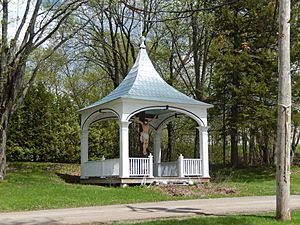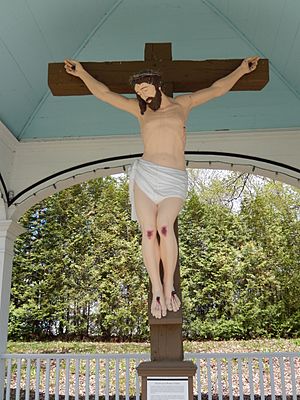Calvaire de la Rivière-à-Veillet facts for kids

Calvaire de la Rivière-à-Veillet
|
|
| Coordinates | 46°31′49″N 72°20′21″W / 46.53033°N 72.33928°W |
|---|---|
| Location | Sainte-Geneviève-de-Batiscan, Les Chenaux Regional County Municipality, Mauricie, Quebec, Canada |
| Designer | François Baillairgé |
| Type | Calvary |
| Beginning date | 1827 |
| Restored date | 2006 |
| Dedicated to | Christ |
The Calvaire de la Rivière-à-Veillet is a special kind of monument called a calvary. It's located right behind the church in Sainte-Geneviève-de-Batiscan, a town in Quebec, Canada. You can find it on "rue du Centre," which goes around the church.
This calvary is really old, actually the second oldest in Quebec! It has been a quiet place for people to think and pray for a very long time. Until the 1960s, people would even gather there every day in May to pray.
In 1985, a group called the Sainte-Geneviève-de-Batiscan Historical Society started taking care of it. Because it's so important, the local government officially recognized it as a cultural heritage building in 2002.
History of the Calvaire
The idea for the Calvaire de la Rivière-à-Veillet came from a trip. A priest named Father F.-X. Côté visited a similar monument in Oka. He was so inspired that he wanted to build one just like it in Sainte-Geneviève-de-Batiscan. His plan was to create a cross with a wooden roof over it.
The calvary was likely built in 1827. It was part of a larger religious path called the Stations of the Cross. The sculpture of Christ on the cross might even be older than the structure itself. Some people think the famous artist François Baillairgé might have created the sculpture. This makes it one of the oldest calvaries still standing in Quebec.
Originally, the calvary was on a hill near the church. In 1846, it was moved for the first time to a different spot. Then, in 2006, after 60 years, it was moved back closer to its first location in the village. It was also repaired and painted that same year, making sure Christ on the cross looked like it did originally.
In the late 1800s, the other parts of the original Stations of the Cross were taken down. A new set was put inside the church instead. In 1879, the calvary was given to the people living in the area called Rang de la Rivière-à-Veillet.
On November 11, 2002, the calvary was officially named a cultural heritage building. This helps protect it for future generations.
What the Calvaire Looks Like
The Calvaire de la Rivière-à-Veillet has a simple but strong design. It has a roof made of metal strips that curves downwards. This roof is held up by four wooden posts at each corner. At the very top of the roof, there's a wooden ball. Inside the monument, right in the middle, is a large sculpture of Christ on the cross. The sides are open, so you can see the sculpture clearly.


